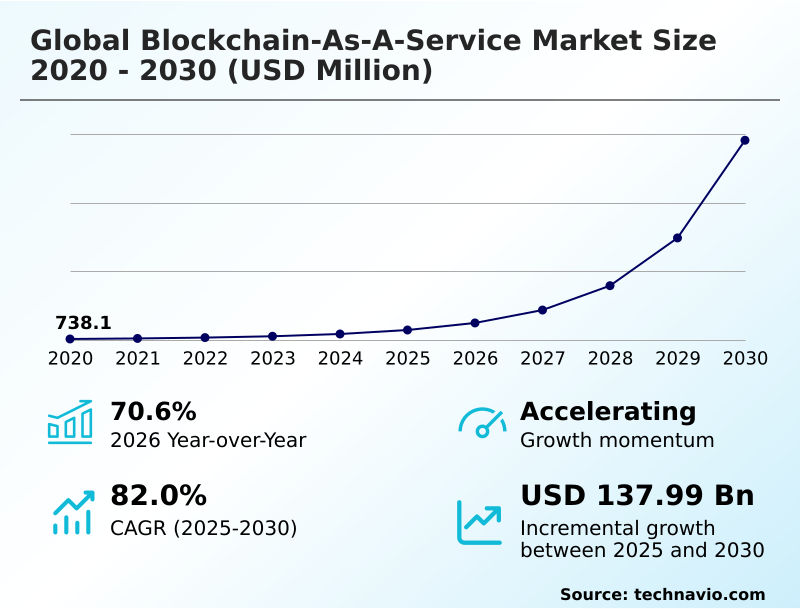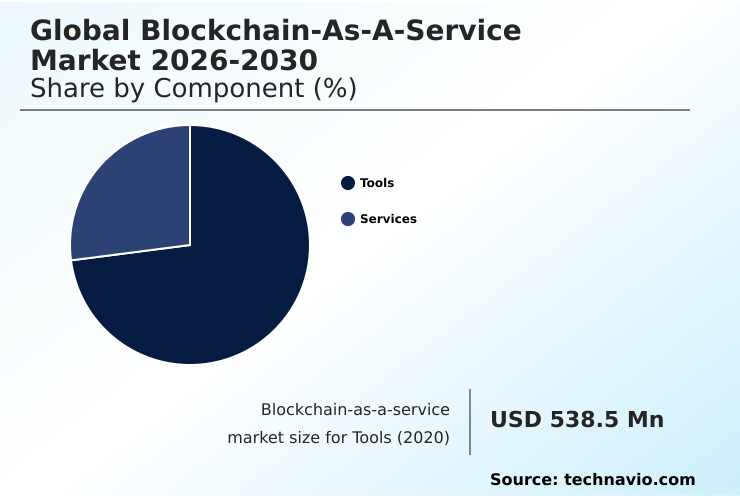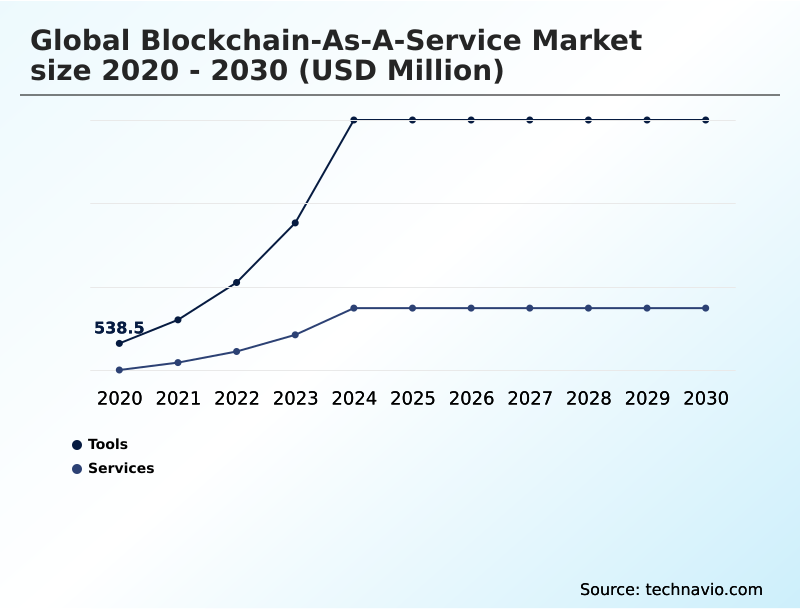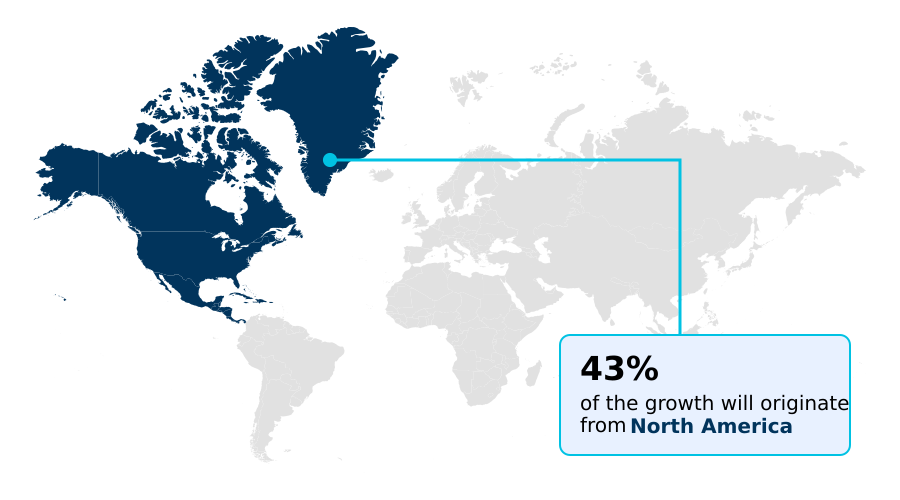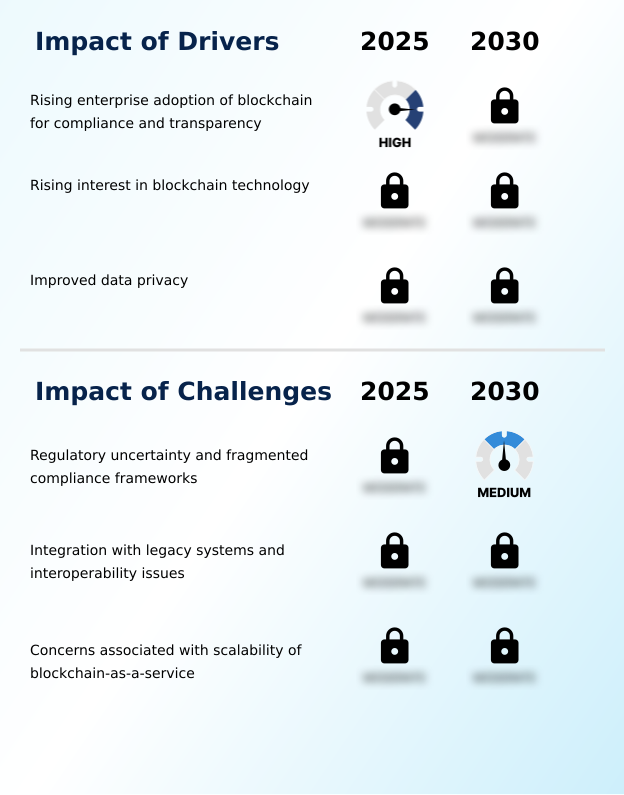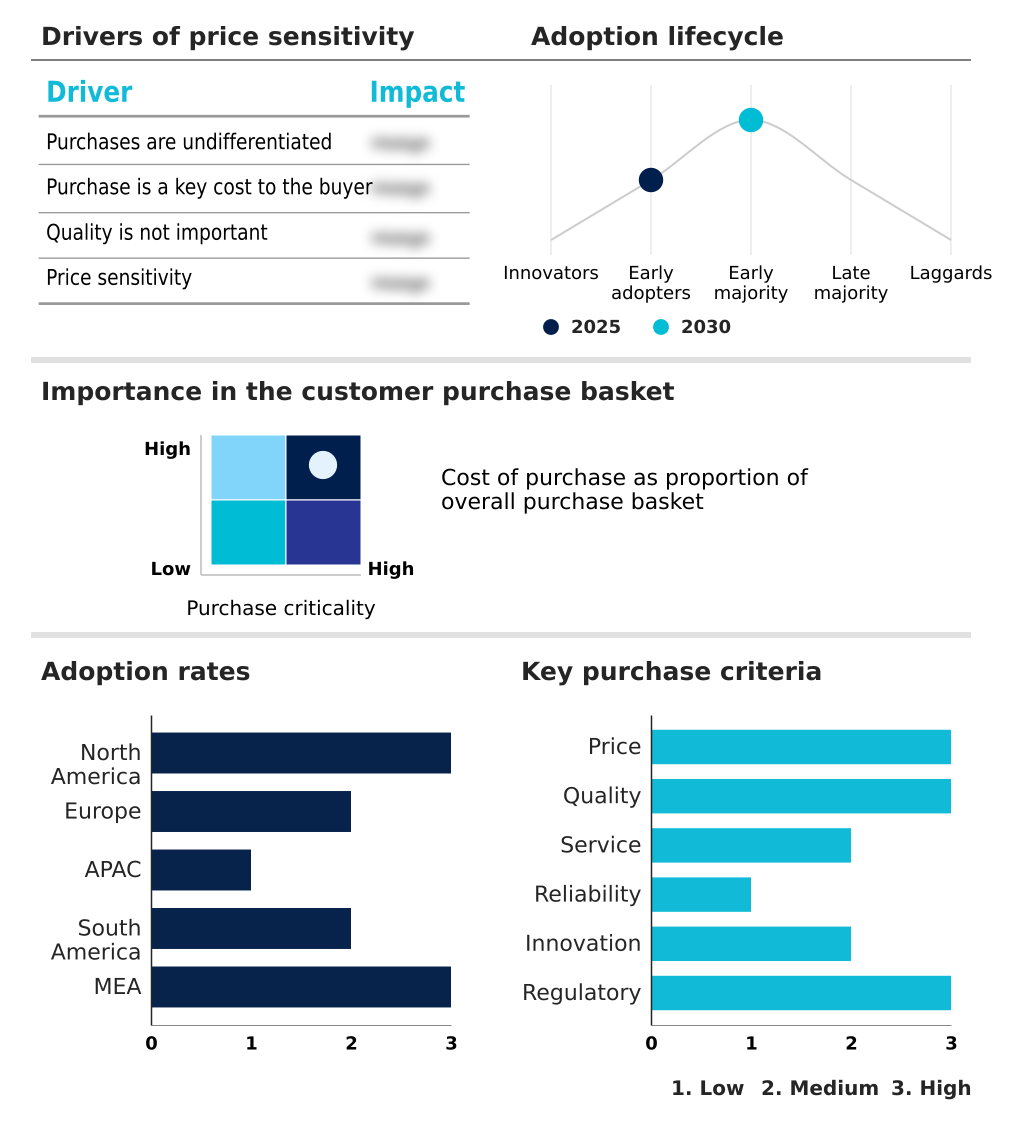Blockchain-as-a-service Market Size 2026-2030
The blockchain-as-a-service market size is valued to increase by USD 137.99 billion, at a CAGR of 82% from 2025 to 2030. Rising enterprise adoption of blockchain for compliance and transparency will drive the blockchain-as-a-service market.
Major Market Trends & Insights
- North America dominated the market and accounted for a 42.6% growth during the forecast period.
- By Component - Tools segment was valued at USD 3.39 billion in 2024
- By End-user - Large enterprises segment accounted for the largest market revenue share in 2024
Market Size & Forecast
- Market Opportunities: USD 144.52 billion
- Market Future Opportunities: USD 137.99 billion
- CAGR from 2025 to 2030 : 82%
Market Summary
- The Blockchain-as-a-Service market is defined by the provision of cloud-based infrastructure that allows organizations to build, host, and operate blockchain applications without managing the underlying hardware. This model democratizes access to distributed ledger technology, enabling businesses to leverage tamper-proof data records and smart contract deployment for digital transformation.
- Key drivers include the enterprise-level demand for enhanced transparency and auditable transaction trails, particularly in regulated industries. For example, a global logistics company can use a BaaS platform to create an immutable ledger for tracking goods from origin to destination, reducing fraud and improving supply chain efficiency. This BaaS for supply chain management enhances visibility for all stakeholders.
- A significant trend is the move toward multi-chain interoperability, allowing decentralized applications (dApps) to communicate across different networks. However, challenges such as blockchain scalability solutions and the complexity of blockchain integration with enterprise systems remain.
- The evolution of managed blockchain services is focused on abstracting this complexity, offering BaaS developer and API toolkits and scalable dApp development tools that accelerate adoption and enable new business models built on decentralized finance (DeFi) platforms and digital asset tokenization.
What will be the Size of the Blockchain-as-a-service Market during the forecast period?
Get Key Insights on Market Forecast (PDF) Request Free Sample
How is the Blockchain-as-a-service Market Segmented?
The blockchain-as-a-service industry research report provides comprehensive data (region-wise segment analysis), with forecasts and estimates in "USD million" for the period 2026-2030, as well as historical data from 2020-2024 for the following segments.
- Component
- Tools
- Services
- End-user
- Large enterprises
- SMEs
- Deployment
- Public cloud
- Private cloud
- Hybrid cloud
- Geography
- North America
- US
- Canada
- Mexico
- Europe
- Germany
- UK
- France
- APAC
- China
- Japan
- India
- South America
- Brazil
- Argentina
- Middle East and Africa
- UAE
- Saudi Arabia
- Israel
- Rest of World (ROW)
- North America
By Component Insights
The tools segment is estimated to witness significant growth during the forecast period.
The tools subsegment within the blockchain-as-a-service market consists of software platforms, development kits, and frameworks that facilitate the creation and management of blockchain applications.
These foundational layers, including blockchain application programming interfaces (APIs) and orchestration tools, allow enterprises to build decentralized applications (dApps) without extensive infrastructure overhead. Adoption is centered on solutions that enhance smart contract deployment and ensure cryptographic security protocols.
The market is seeing a shift toward low-code platforms and integrated development environments that incorporate on-chain data analytics and blockchain node management.
These tools are pivotal for accelerating development cycles, with some platforms improving developer productivity by up to 40% by abstracting backend complexities.
This enables a stronger focus on digital asset tokenization and custom governance models for blockchains for enterprise blockchain solutions and BaaS for supply chain management.
The Tools segment was valued at USD 3.39 billion in 2024 and showed a gradual increase during the forecast period.
Regional Analysis
North America is estimated to contribute 42.6% to the growth of the global market during the forecast period.Technavio’s analysts have elaborately explained the regional trends and drivers that shape the market during the forecast period.
See How Blockchain-as-a-service Market Demand is Rising in North America Request Free Sample
The geographic landscape of the blockchain-as-a-service (BaaS) platform market is characterized by strong regional hubs of innovation and adoption, with North America contributing over 42% of the incremental growth opportunity.
In this region, digital identity verification and financial services are key applications. The region's leadership is reinforced by a dense ecosystem of technology providers and a strong enterprise focus on cryptographic security protocols.
In Canada, for instance, a significant innovation cluster has emerged, with 70% of the country's blockchain startups based in Ontario. Europe is another major market, driven by clear regulatory frameworks and adoption in supply chain and tokenized asset management.
Meanwhile, the APAC region is experiencing rapid growth, led by government initiatives and large-scale deployments in decentralized finance (DeFi) platforms and smart contract auditing.
Market Dynamics
Our researchers analyzed the data with 2025 as the base year, along with the key drivers, trends, and challenges. A holistic analysis of drivers will help companies refine their marketing strategies to gain a competitive advantage.
- Enterprises are increasingly exploring the benefits of BaaS for small-medium enterprises, as managed services lower the barrier to entry. A BaaS providers features comparison analysis is a critical first step, helping organizations in estimating the cost of deploying BaaS solutions. A primary use case is implementing blockchain for supply chain transparency, which offers data integrity far exceeding traditional systems.
- In life sciences, using blockchain for clinical trial data management ensures immutable records, while other sectors examine how to use BaaS for digital identity verification to combat fraud. The advantages of multi-chain BaaS platforms include flexibility, which is vital when building dApps with managed blockchain services.
- For regulated firms, BaaS for navigating regulatory compliance frameworks is a key driver, especially a hybrid blockchain architecture for financial institutions. The process of tokenizing real estate assets with blockchain and adhering to best practices for secure smart contract development is also becoming mainstream.
- Despite key enterprise blockchain adoption challenges like blockchain integration with legacy ERP systems, the benefits are compelling. The decentralized finance platform security architecture is a core focus, as is understanding how BaaS enables secure cross-border payments.
- The benefits of immutable ledgers for financial auditing and private blockchain for secure healthcare data exchange are clear, though strategies for managing cryptographic keys in BaaS and understanding examples of on-chain governance models remain crucial for success.
What are the key market drivers leading to the rise in the adoption of Blockchain-as-a-service Industry?
- The rising adoption of blockchain by enterprises to achieve greater compliance and transparency is a key driver for market growth.
- Enterprise adoption is primarily driven by the need for enhanced regulatory compliance and data transparency. The use of distributed ledger technology provides an immutable ledger and tamper-proof data records, which are critical for blockchain for regulatory compliance.
- Industries are leveraging BaaS for regulatory reporting, with firms reporting a 30% reduction in audit-related costs. This is particularly evident in blockchain in financial services and healthcare data management on blockchain, where ledger data immutability is paramount.
- The ability to create auditable transaction trails automatically streamlines compliance with stringent mandates.
- Furthermore, as environmental, social, and governance (ESG) standards become more critical, blockchain for ESG data verification is emerging as a key application, with a 20% increase in adoption over the past year.
What are the market trends shaping the Blockchain-as-a-service Industry?
- The growing adoption of multi-chain and interoperability solutions is a prominent upcoming trend. This shift allows enterprises to leverage the distinct strengths of various protocols for enhanced flexibility.
- A prominent trend is the accelerating adoption of multi-chain interoperability and cross-chain communication, driven by enterprise demand for flexible and scalable decentralized applications (dApps). Organizations are moving beyond single-network limitations, using hybrid blockchain architecture to connect permissioned blockchain environments with public blockchain network ecosystems.
- This approach, which improves transaction finality times by over 40%, enables seamless data exchange and automated smart contract execution across disparate systems. The rise of interoperable blockchain ecosystems is supported by BaaS developer and API toolkits that simplify the integration of protocols.
- This push toward interoperability is crucial for complex use cases like BaaS for trade finance and cross-border payment solutions, where data must flow securely across multiple ledgers, improving operational efficiency by at least 25%.
What challenges does the Blockchain-as-a-service Industry face during its growth?
- Regulatory uncertainty and fragmented compliance frameworks present a key challenge that affects industry growth and cross-jurisdictional deployments.
- Significant challenges stem from regulatory fragmentation and the technical complexities of system integration. The lack of harmonized global compliance frameworks creates uncertainty, delaying project rollouts by an average of six to nine months and increasing reliance on specialized legal counsel.
- Integrating distributed consensus algorithms and blockchain scalability solutions with existing enterprise systems is a major technical hurdle, often adding over 35% to initial project costs. Concerns around blockchain data privacy and private key management solutions in a cloud-based blockchain infrastructure also hinder adoption.
- While permissioned vs permissionless networks offer different security models, navigating the trade-offs between control and decentralization remains a complex decision for enterprises, impacting the viability of enterprise-grade blockchain platforms.
Exclusive Technavio Analysis on Customer Landscape
The blockchain-as-a-service market forecasting report includes the adoption lifecycle of the market, covering from the innovator’s stage to the laggard’s stage. It focuses on adoption rates in different regions based on penetration. Furthermore, the blockchain-as-a-service market report also includes key purchase criteria and drivers of price sensitivity to help companies evaluate and develop their market growth analysis strategies.
Customer Landscape of Blockchain-as-a-service Industry
Competitive Landscape
Companies are implementing various strategies, such as strategic alliances, blockchain-as-a-service market forecast, partnerships, mergers and acquisitions, geographical expansion, and product/service launches, to enhance their presence in the industry.
Accenture PLC - Offering blockchain-as-a-service solutions centered on distributed ledger technologies that enable enterprises to build and scale secure, decentralized applications and smart contracts for various business ecosystems.
The industry research and growth report includes detailed analyses of the competitive landscape of the market and information about key companies, including:
- Accenture PLC
- Alchemy Insights Inc.
- Altoros Americas LLC
- Amazon.com Inc.
- Baidu Inc.
- Bitfury Group Ltd.
- Capgemini Service SAS
- Deloitte Touche Tohmatsu Ltd.
- Hewlett Packard
- Huawei Technologies Co. Ltd.
- Infosys Ltd.
- IBM Corp.
- Oracle Corp.
- SAP SE
- Stratis Group Ltd.
- Tata Consultancy Services
- Tech Mahindra Ltd.
- Wipro Ltd.
Qualitative and quantitative analysis of companies has been conducted to help clients understand the wider business environment as well as the strengths and weaknesses of key industry players. Data is qualitatively analyzed to categorize companies as pure play, category-focused, industry-focused, and diversified; it is quantitatively analyzed to categorize companies as dominant, leading, strong, tentative, and weak.
Recent Development and News in Blockchain-as-a-service market
- In August, 2025, Amazon Web Services launched its Blockchain Data Hosting and Compliance Suite, featuring immutable audit trails and automated compliance monitoring to address stringent regulatory requirements.
- In May, 2025, Maersk integrated blockchain-based carbon tracking tools into its logistics operations, leveraging BaaS platforms to provide verifiable emissions data to regulators and customers.
- In April, 2025, Microsoft Azure expanded its blockchain toolkit to include zero-code smart contract templates and multi-chain interoperability, enabling enterprises to integrate Ethereum and Hyperledger Fabric seamlessly.
- In March, 2025, Pfizer partnered with a leading BaaS provider to implement blockchain-based systems for clinical trial data management, ensuring transparency and adherence to regulatory protocols.
Dive into Technavio’s robust research methodology, blending expert interviews, extensive data synthesis, and validated models for unparalleled Blockchain-as-a-service Market insights. See full methodology.
| Market Scope | |
|---|---|
| Page number | 293 |
| Base year | 2025 |
| Historic period | 2020-2024 |
| Forecast period | 2026-2030 |
| Growth momentum & CAGR | Accelerate at a CAGR of 82% |
| Market growth 2026-2030 | USD 137987.7 million |
| Market structure | Fragmented |
| YoY growth 2025-2026(%) | 70.6% |
| Key countries | US, Canada, Mexico, Germany, UK, France, Italy, Spain, The Netherlands, China, Japan, India, South Korea, Australia, Indonesia, Brazil, Argentina, Chile, UAE, Saudi Arabia, Israel, South Africa and Turkey |
| Competitive landscape | Leading Companies, Market Positioning of Companies, Competitive Strategies, and Industry Risks |
Research Analyst Overview
- The blockchain-as-a-service (BaaS) platform market is maturing from nascent technology to a core enterprise tool, driven by the clear value proposition of distributed ledger technology. Boardroom decisions are increasingly influenced by the strategic need for tamper-proof data records and digital signature verification to meet stringent compliance mandates.
- This shift is exemplified by the growing use of hybrid blockchain architecture for use cases requiring both privacy and public verifiability. The focus on multi-chain interoperability and sidechain technology addresses previous limitations, allowing decentralized applications (dApps) to function across ecosystems.
- Platforms offering pre-configured compliance modules for digital asset tokenization and on-chain transaction data have seen a 30% faster adoption rate compared to generic offerings. This is because they directly address the operational complexities of blockchain node management, smart contract auditing, and ensuring cryptographic security protocols.
- The technology's evolution, particularly with zero-knowledge proofs and secure multi-party computation, is solidifying its role in decentralized finance (DeFi) platforms and secure data sharing.
What are the Key Data Covered in this Blockchain-as-a-service Market Research and Growth Report?
-
What is the expected growth of the Blockchain-as-a-service Market between 2026 and 2030?
-
USD 137.99 billion, at a CAGR of 82%
-
-
What segmentation does the market report cover?
-
The report is segmented by Component (Tools, and Services), End-user (Large enterprises, and SMEs), Deployment (Public cloud, Private cloud, and Hybrid cloud) and Geography (North America, Europe, APAC, South America, Middle East and Africa)
-
-
Which regions are analyzed in the report?
-
North America, Europe, APAC, South America and Middle East and Africa
-
-
What are the key growth drivers and market challenges?
-
Rising enterprise adoption of blockchain for compliance and transparency, Regulatory uncertainty and fragmented compliance frameworks
-
-
Who are the major players in the Blockchain-as-a-service Market?
-
Accenture PLC, Alchemy Insights Inc., Altoros Americas LLC, Amazon.com Inc., Baidu Inc., Bitfury Group Ltd., Capgemini Service SAS, Deloitte Touche Tohmatsu Ltd., Hewlett Packard, Huawei Technologies Co. Ltd., Infosys Ltd., IBM Corp., Oracle Corp., SAP SE, Stratis Group Ltd., Tata Consultancy Services, Tech Mahindra Ltd. and Wipro Ltd.
-
Market Research Insights
- The market is defined by the rapid evolution of managed blockchain services designed to simplify enterprise adoption. These cloud-based blockchain infrastructure offerings are critical as organizations increasingly prioritize BaaS integration with enterprise systems to enhance transparency and security.
- Adoption rates for enterprise blockchain solutions have increased by over 50% in regulated sectors, driven by the need for an immutable audit trail for compliance. For instance, BaaS for supply chain management solutions have demonstrated the ability to reduce product recall times by more than 95%.
- Furthermore, the deployment of decentralized identity systems is gaining traction, with pilots showing a potential 60% reduction in customer onboarding friction. The focus is shifting from exploration to production, with BaaS pricing and cost models becoming more sophisticated to support scalable, long-term deployments.
We can help! Our analysts can customize this blockchain-as-a-service market research report to meet your requirements.

